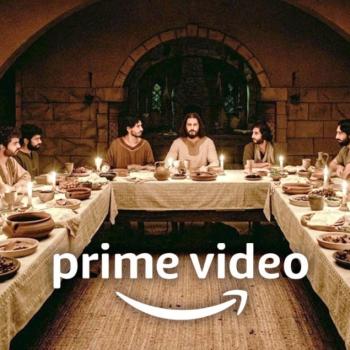It has been a month since For Greater Glory opened in theaters in the United States. The film is a dramatic telling of some of the events of the Cristero war, a short but bloody civil war in Mexico sparked by anti-Catholic oppression by the government of Plutarcho Calles. Given its overtly religious storyline and the connections being drawn between the events in Mexico in the 1920’s and today, I figured that it was a worthy topic for a blog post. However, I have a slight problem: I haven’t seen the movie. This happened for lots of reasons, but two stand out: 1) I don’t go to a lot of movies; 2) I tend to avoid movies that are controversial or hyped. (Sometimes I get carried away: though Romero came out over 20 years ago, I still haven’t seen it, despite my admiration for the man.)
(Image from www.gocomics.com, June 30, 2012)
Nevertheless, I want to write a bit about the movie because the events it depicts touched my own family in complicated ways. My father and his family lived through the war: my father, born in 1910, was a teenager at the time. Moreover, according to sketchy family oral history, my grandfather was both a government tax collector and a member of the Knights of Columbus during this period. As a young child I was introduced to a friend of the family. a cloistered nun named Sister Infant Jesus. The sister was Mexican but lived in the US. I was told that when a novice she had been smuggled out of Mexico in a box car. And growing up I was aware of the vestiges of anti-clericalism that persisted in Mexico. (Paradoxically, this made Mexico a popular vacation destination of the priests who ran the high school my older brothers attended. They liked being able to go on vacation in mufti, since priests were forbidden to wear clerical garb in public.) Nevertheless, my father remained a good Catholic (well, reasonably good) and a somewhat chauvinist supporter of the PRI: the political party which was a direct descendent of the revolutionary government of Calles.
The film had a limited release and while it did reasonably well at the box office (just edging into the top 10 the week it opened) it was a critical failure. The summary site Rotten Tomatoes gives it a dismal 16% rating among mainstream (secular) movie critics. (By comparison, Adam Sandler’s dreadful film Click received a 33% rating.) The critics panned it for being sincere but heavy handed and cliche ridden. Watching the trailer I suspect there is some basis for these critiques: as my wife put it, at the end of two minutes we were drowning in earnestness. And the historical timeline presented on the film’s website suggested a very one-sided reading of a complex series of events. (My grandfather, KofC member and government tax collector, shows that things were not black and white at the time.)
The film has received critical acclaim from Catholics, particularly conservative Catholics. Archbishop Chaput of Philadelphia, contrary to secular movie critics, praised its cinematic quality. He wrote in his weekly column:
“For Greater Glory” succeeds where so many similar films have failed. Led by Academy Award nominees Andy Garcia and Catalina Sandino Moreno, along with Oscar Isaac, Eva Longoria, Ruben Blades, Eduardo Verastegui and others, the cast is superb. And the writing gives them the kind of robust material they need to work with: strong dialogue, fully developed characters, vivid moral conflicts in a time of revolutionary violence and a compelling story that never lags, thanks to the skilled directing of Dean Wright.
In the end all tastes are tastes, and since I have not seen the film I cannot gainsay him. Indeed, I remember in the 80’s passionately defending the anti-communist thriller Red Dawn which was equally panned by most mainstream critics. (I still defend the film, but that is another story.)
More problematic for me have been the endorsements that draw parallels between Mexico in the 1920’s and the United States today. This began with those connected with the film. Eduardo Verastegui, one of the actors, told CNS News in an interview that
I don’t see any difference between Plutarco Elias Calles and President Obama or Henry VIII.
The Knights of Columbus have been very outspoken in this regard. Major financial backers of the film, Supreme Knight Carl Anderson said of the film in the May 2012 issue of Columbia magazine:
Today in the United States, it is impossible to recall these events without thinking of current threats to religious liberty, including the Obama administration’s insistence that contraceptives, sterilization and abortion-inducing drugs be included in the health insurance programs of Catholic organizations. The federal mandate is backed by the threat of millions of dollars in fines if Catholic organizations refuse to comply as a matter of conscience.
The whole issue of Columbia magazine, whose cover shows and armed Cristero in silhouette, is devoted to the movie and to “real history” of the Cristero war. (In fairness to Carl Anderson, his column in the National Review about the movie was much more nuanced.) A sharp critique of the Knights of Columbus comes from Steve Schneck of the Catholic Alliance for the Common Good. He writes:
Columbia’s implication is that things are so dire for American Catholics that even extreme rhetoric is not enough. Given the illustrated cover and Anderson’s connecting-the-dots, the implication is what? That it’s time for armed resistance?
A number of other endorsements which draw similar connections between past and present can be found here. George Weigel, in his usual one-sided fashion, praises the movie and draws out the parallels between then and now in detail. He concludes his review with a warning:
It is even more important, though, that those who haven’t yet seen the threat, or who deny that it exists, ponder this powerful depiction of the nearby and not-so-distant past, for the sake of the present and future.
(For a caustic rejoinder see Michael Sean Winter’s blog.)
So, in the end, what can I say about a movie I have not seen? First, nothing I have seen really makes me want to see it. And like Romero before it, I am dubious of the ways in which the story has been co-opted for political purposes. (An admittedly extreme example can be found here.) Second, I am concerned that the complex history which produced the civil war is being whitewashed into a simplistic good guys versus bad guys narrative. (The Cristeros, of course, being the good guys.) Given my own family history, as well as a brief review of the scholarship of the period, I think that this approach is untenable. The virulent anti-Catholicism of Calles and the 1917 Constitution was and is reprehensible. But it did not emerge in a vacuum. The Church, particularly the hierarchy, was closely associated with the aristocracy and the land owners, and had resisted all attempts to curtail its role in civil society. (By which I mean not civil liberties as we enjoy them now, but the kinds of rights and privileges associated with the ancien regime.) It does not justify the repression of the Church, but it does help explain why it came to pass. Furthermore, the Cristeros were at times as brutal as the government they were fighting. A Cristero partisan assassinated President Obregon as he was taking office, even though Obregon was definitely more moderate than Calles. While there is great glory in dying for the faith (for which reason we honor the Mexican martyrs), killing for the faith is a more complicated proposition. Again, the brutality of the Calles regime explains why this happened, but does it justify it?
I am going to leave the final word to Fr. Robert Barron, whose reflections on what it really means to say “Long Live Christ the King” speak volumes.
















